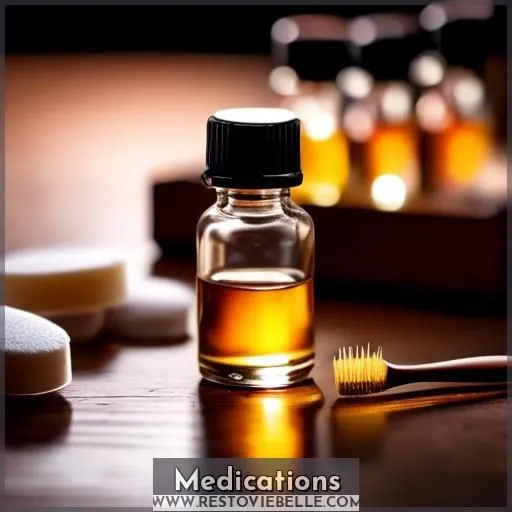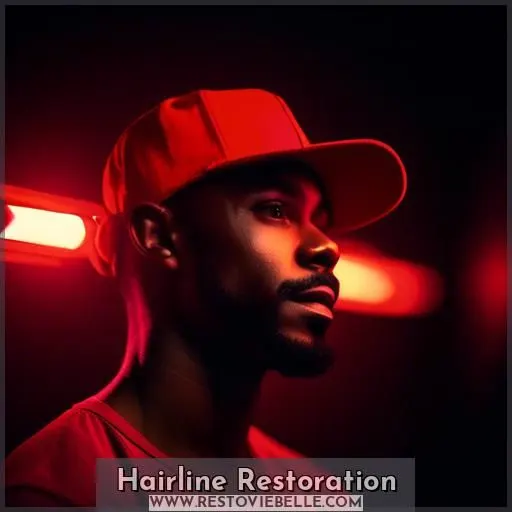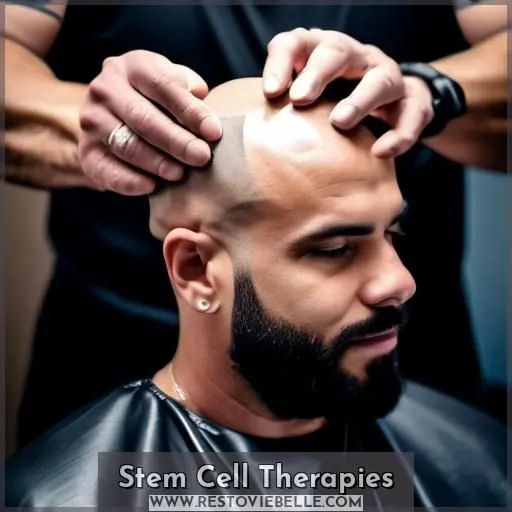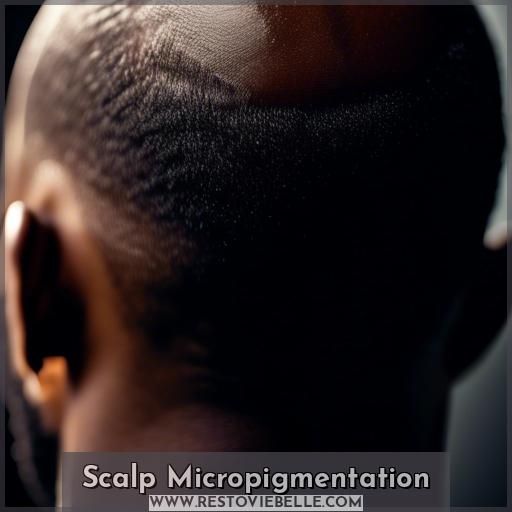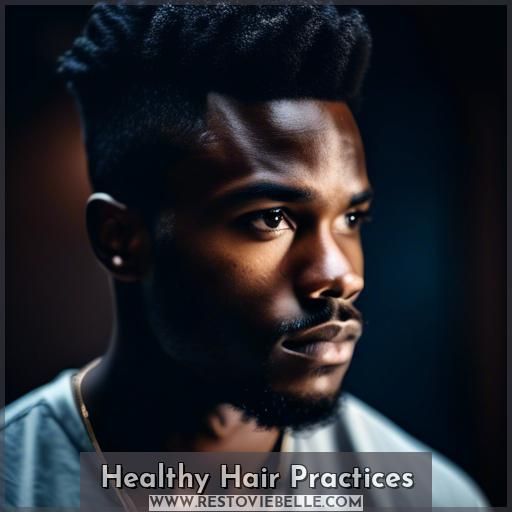This site is supported by our readers. We may earn a commission, at no cost to you, if you purchase through links.
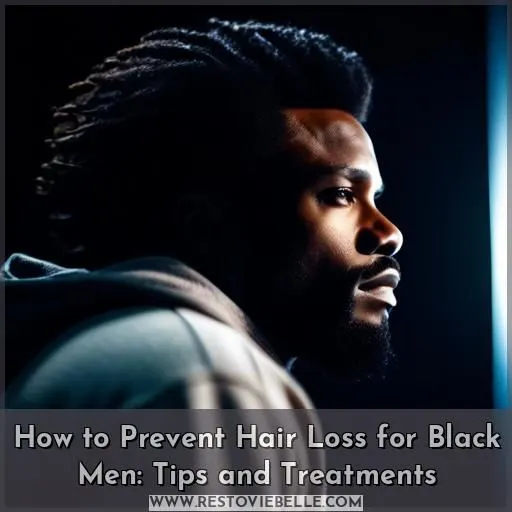 You’ve heard the saying a stitch in time saves nine, and that couldn’t be truer when preventing hair loss for Black men.
You’ve heard the saying a stitch in time saves nine, and that couldn’t be truer when preventing hair loss for Black men.
Taking proactive steps early on can halt or even reverse thinning locks.
This comprehensive guide delves into haircare styles, medications, therapies, and more.
Empowering you to maintain your crown’s glory.
Embrace the knowledge within, and regain control over your natural confidence.
Table Of Contents
- Key Takeaways
- How to Prevent Hair Loss for Black Men?
- Change Your Style
- Medications
- Manage Your Stress
- Medication
- Hairline Restoration
- Red Light Therapy
- Platelet-rich Plasma (PRP) Therapy
- Stem Cell Therapies
- Scalp Micropigmentation
- Healthy Hair Practices
- Frequently Asked Questions (FAQs)
- What are the most effective natural remedies for promoting hair growth in Black men?
- How often should Black men with afro hair wash their hair to prevent hair loss?
- Can stress-reducing practices like meditation and yoga help prevent hair loss in Black men?
- What are the potential side effects of using finasteride for hair loss in Black men?
- Can scalp micropigmentation be used as a preventative measure for hair loss in Black men?
- Conclusion
Key Takeaways
- Choose protective hairstyles to prevent traction alopecia
- Use haircare products specifically designed for African-American hair
- Consider medications like finasteride or minoxidil, or natural remedies like essential oils
- Manage stress through exercise, diet, mindfulness practices, and a support network
How to Prevent Hair Loss for Black Men?
To prevent hair loss for black men, it’s essential to avoid hairstyles that put excessive strain on your hair, such as tight ponytails, frequent chemical treatments, or styles that involve pulling on the scalp and hair follicles, like dreadlocks or tight cornrows.
Maintaining a balanced diet rich in protein, vitamins, and minerals is also crucial for healthy hair growth. If you suspect you have folliculitis, a skin condition that can lead to hair loss, avoid any hairstyling that involves a razor.
Seeking timely medical attention is also important if you are experiencing hair loss. Effective treatments for hair loss in black men include minoxidil, finasteride, hair transplant surgery, PRP therapy, laser therapy, and alternative approaches like MDhair’s Restore Serum.
Change Your Style
First and foremost, it’s crucial to consider your hairstyle choices. Traction alopecia, a common cause of hair loss, can be triggered by hairstyles that pull on your hair, such as dreadlocks or tight cornrows. Opt for protective styles like braids, twists, or weaves that put less strain on your follicles. Remember, the health of your scalp and follicles is just as important as the overall appearance of your hair.
When it comes to hair care, choose products specifically designed for African-American hair. These formulations are tailored to enhance the unique characteristics of your hair type, ensuring it remains healthy and strong. Invest in high-quality shampoos and conditioners that gently cleanse and moisturize your hair without causing damage.
In the realm of hair styling, avoid using heat tools excessively. Heat can weaken your hair and lead to breakage, ultimately contributing to hair loss. Instead, embrace natural styling techniques that promote healthy hair growth.
Lastly, be mindful of your hair products. Some may contain harsh chemicals that can damage your hair and scalp over time. Opt for products that are free from sulfates, parabens, and other potentially damaging ingredients. By making these changes, you’ll be navigating the complexities of hair loss prevention with confidence.
Medications
When it comes to preventing hair loss, medications are a crucial part of the equation. You might be wondering, What’s the most effective medication for my receding hairline? Well, let’s dive into the world of hair loss treatments.
Minoxidil, also known as Rogaine, is a topical medication that can help slow down hair loss and promote regrowth. It’s available over the counter and is applied directly to the scalp. However, it’s not a one-size-fits-all solution. For some, it may work wonders, while for others, it mightn’t yield the desired results.
Finasteride, on the other hand, is a prescription medication that’s designed to block the conversion of testosterone to DHT, a hormone that contributes to hair loss. It’s effective, but it comes with potential side effects, such as decreased libido and erectile dysfunction.
If you’re looking for generic medication options, there are over-the-counter treatments that can help. These medications are designed to enhance your hair growth and are tailored to meet your specific needs.
But what about natural remedies? Some people swear by essential oils like peppermint and rosemary oil, which are believed to stimulate hair growth. Others turn to acupuncture or scalp micropigmentation for a more holistic approach.
Ultimately, the choice of medication depends on your individual needs and preferences. It’s not merely about finding the most effective medication; it’s about navigating the complexities of hair loss treatments to find what works best for you.
Manage Your Stress
Managing stress is crucial for Black men seeking to prevent hair loss and maintain a healthy scalp. Stress can reduce blood flow to the scalp, inhibiting hair growth and weakening hair strands.
- Identify stress triggers: Recognize and avoid situations that cause stress.
- Exercise regularly: Physical activity releases endorphins, which can improve mood and reduce stress.
- Healthy diet: Eating a balanced diet can help manage stress and promote hair growth.
- Mindfulness practices: Techniques like meditation, deep breathing, or yoga can help reduce stress.
- Support network: Connect with friends, family, or a therapist to discuss your feelings.
By managing stress, you can improve blood flow to the scalp, stimulating hair growth and reducing the risk of hair loss. Remember, stress reduction is a continuous process, and it’s essential to find what works best for you in your ever-evolving life.
Medication
When it comes to preventing hair loss, medication is one of the most effective options available for black men. Here’s what you need to know:
Finasteride is a medication that blocks the conversion of testosterone to dihydrotestosterone (DHT), which is responsible for shrinking hair follicles and causing hair loss. It’s available as a generic medication and as the branded version Propecia. Finasteride is effective in over 80% of users, with studies showing that it can regrow hair in around 90% of men. However, it’s essential to consult a healthcare professional before using finasteride, as it requires a prescription and can have side effects such as a decreased libido, erectile dysfunction, or changes in ejaculation.
Minoxidil is another medication that can be used to treat hair loss. It’s applied topically and stimulates hair growth by increasing blood flow to the hair follicles. Minoxidil is available over the counter and can be used in combination with finasteride for better results. However, it may cause side effects such as scalp irritation, unwanted hair growth, or dizziness.
Both finasteride and minoxidil have side effects, which can vary from person to person. It’s essential to discuss these side effects with your healthcare professional before starting any medication. Additionally, it’s crucial to follow the recommended dosage and usage instructions to ensure safety and effectiveness.
Some hair regrowth products, such as MDHair Restore Serum, can be used in conjunction with medication to enhance hair growth. These products are designed to promote healthy hair growth and can be used alongside other treatments.
Red light therapy is a non-invasive treatment that can help stimulate hair growth by increasing blood flow to the scalp. It can be used in combination with medication and other treatments for better results.
In addition to medication, it’s essential to maintain a healthy lifestyle to promote hair growth. This includes a balanced diet, regular exercise, stress reduction, and avoiding hairstyles that cause strain on the hair follicles.
Hairline Restoration
After exploring the world of medications, let’s dive into the transformative journey of hairline restoration.
If you’re witnessing your hairline beat a hasty retreat, fear not!
Hairline lowering and tackling temporal recession have become more accessible than ever. Surgical options, like hair transplant surgery, offer a beacon of hope. Here, hair from a donor area is moved to the recipient area, reviving your hairline’s former glory.
But if surgery sounds like a leap, consider scalp micropigmentation for a non-invasive illusion of fullness.
For those leaning towards nature’s gifts, platelet-rich plasma (PRP) therapy and stem cell therapies are on the frontline, promising rejuvenation by harnessing your body’s healing powers.
Red Light Therapy
Red light therapy is a non-invasive treatment that stimulates hair growth and can be a game-changer for men experiencing hair loss.
By using red and near-infrared light, this therapy increases energy at the cellular level, sparks beneficial biological processes, and promotes healthy cell functioning.
Research has shown that light in the 630nm to 660nm range is particularly effective for treating hair loss.
This therapy is safe, natural, and can be used at home, making it an accessible option for many.
It has been found to be effective for both male and female pattern baldness, and can even improve hair count, density, thickness, and strength.
If you’re interested in trying red light therapy for hair growth, it’s advisable to consult with your doctor first, especially if you have experienced sudden or dramatic hair loss, which could signal a serious underlying condition.
Platelet-rich Plasma (PRP) Therapy
PRP Therapy: A Safe and Effective Hair Loss Treatment
PRP therapy, or platelet-rich plasma therapy, has gained popularity for treating hair loss in both men and women. The treatment involves using a patient’s own blood cells to stimulate hair growth and prevent further hair loss. Let’s explore the efficacy, safety, cost, and side effects of PRP therapy for hair loss.
Efficacy: PRP therapy can be effective in treating male pattern baldness, both in preventing hair loss and promoting new hair growth. It can also aid in the growth of hair transplants and enhance other cosmetic procedures.
Safety: Since PRP therapy uses a patient’s own blood cells, it’s considered safe. The treatment is well-tolerated, and most patients experience only mild side effects such as soreness and bruising at the injection site.
Cost: The cost of PRP therapy can vary widely, ranging from $500 to $2,000 per injection in the United States. The cost may depend on factors such as the healthcare facility, professional expertise, geographic location, and additional treatment costs.
Side Effects: The most common side effects of PRP therapy are soreness and bruising at the injection site, which are typically short-lived and easily managed with ice and over-the-counter medications.
In conclusion, PRP therapy can be a safe and effective treatment option for hair loss in black men. It’s important to consult with a healthcare professional to determine if PRP therapy is the right choice for your specific situation and to discuss the potential benefits and risks.
Stem Cell Therapies
Stem cell therapies are a promising approach to treating hair loss in Black men. These treatments harness the body’s own regenerative capabilities to stimulate dormant hair follicles and promote new hair growth.
- Candidate Selection: Not all individuals are suitable candidates for stem cell hair regrowth treatments. Factors such as the extent of hair loss and the individual’s overall health are considered before proceeding with the therapy.
- Growth Factors: Stem cell therapies work by releasing growth factors that interact with dormant hair follicles, encouraging them to re-enter the growth phase and produce new hair.
- Delivery Methods: The process typically begins with the collection of stem cells from the patient’s body, often through a procedure that extracts a small amount of fat tissue. These cells are then processed and concentrated in a laboratory setting before being injected back into the scalp at the treatment site.
- Future Research: The field of stem cell hair regrowth is still evolving, with ongoing research aimed at enhancing the efficacy and reliability of these treatments. As scientists gain a deeper understanding of the mechanisms behind hair loss and regrowth, it’s anticipated that stem cell therapies will become even more effective and accessible.
- Ethical Considerations: As with any medical treatment, there are ethical considerations to be taken into account when using stem cell therapies for hair loss. These include issues related to patient safety, informed consent, and the use of donor cells.
In conclusion, stem cell therapies offer a promising solution for Black men seeking to address hair loss. While these treatments aren’t without risks and limitations, they hold the potential to provide a more natural and long-lasting solution compared to traditional hair loss treatments. It’s essential to consult with a healthcare professional to determine if stem cell therapies are the right choice for your individual needs.
Scalp Micropigmentation
Scalp micropigmentation is a popular hair loss solution for black men.
It involves the use of micro-pigmentation to create the appearance of hair follicles on the scalp, giving the illusion of a fuller head of hair.
The cost of scalp micropigmentation varies depending on the severity of hair loss, the size of the affected area, and the experience of the practitioner.
On average, the cost ranges from $350 to $3,500.
Most reputable clinics charge between $1,800 to $3,200 for a single session.
The procedure may require one to three sessions, with the cost increasing for more extensive treatments.
Location also plays a role in determining the cost, with major cities in the United States having higher prices.
If you’re considering scalp micropigmentation, it’s essential to research the cost and find a reputable practitioner to ensure the best results.
Healthy Hair Practices
After diving into the world of scalp micropigmentation, let’s shift gears to something equally crucial: healthy hair practices. You’ve got the power to combat hair loss head-on, and it starts with simple, everyday choices.
- Embrace Gentle Hairstyling: Tight styles are a no-go. Think of your hair like a delicate fabric; the less stress, the longer it lasts.
- Live Healthily: Your hair is what you eat, and how you rest and move. A balanced diet, ample sleep, and regular exercise can work wonders.
- Choose Quality Shampoos Wisely: Not all shampoos are created equal. Opt for ones that promise more than just a clean scalp but also nourish and protect against folliculitis.
Frequently Asked Questions (FAQs)
What are the most effective natural remedies for promoting hair growth in Black men?
You bet! Invest in rosemary oil, pumpkin seed oil, and green tea – these will fortify follicles and stimulate new growth. Scalp massages and balanced diets rich in proteins, vitamins, and minerals also promote lush locks naturally.
How often should Black men with afro hair wash their hair to prevent hair loss?
The jury’s still out, but experts recommend washing afro hair 1-2 times weekly – striking the right balance between cleanliness and preserving natural oils. Too much shampooing can lead to dryness and breakage, while infrequent washing allows buildup.
Can stress-reducing practices like meditation and yoga help prevent hair loss in Black men?
You bet! Yoga and meditation lower stress hormones that can contribute to hair loss. These practices promote relaxation, boosting nutrients and oxygen flow to follicles for healthier hair growth.
What are the potential side effects of using finasteride for hair loss in Black men?
Up to 2% of men experience sexual side effects using finasteride for hair loss. Discuss pros and cons thoroughly with your doctor.
Can scalp micropigmentation be used as a preventative measure for hair loss in Black men?
Nope, scalp micropigmentation adds pigment to thinning areas – it doesn’t prevent hair loss. Focus on proven preventative methods like minoxidil, finasteride, gentle hairstyles, and a healthy lifestyle.
Conclusion
Proactive measures, advanced therapies, and lifestyle adjustments can combat hair loss for Black men. Embrace follicle-friendly styles, stress management techniques, medications, and innovative treatments like PRP, stem cells, and light therapy.
Consistent healthy hair habits fortify your crowning glory. Take control – your luscious locks await.


